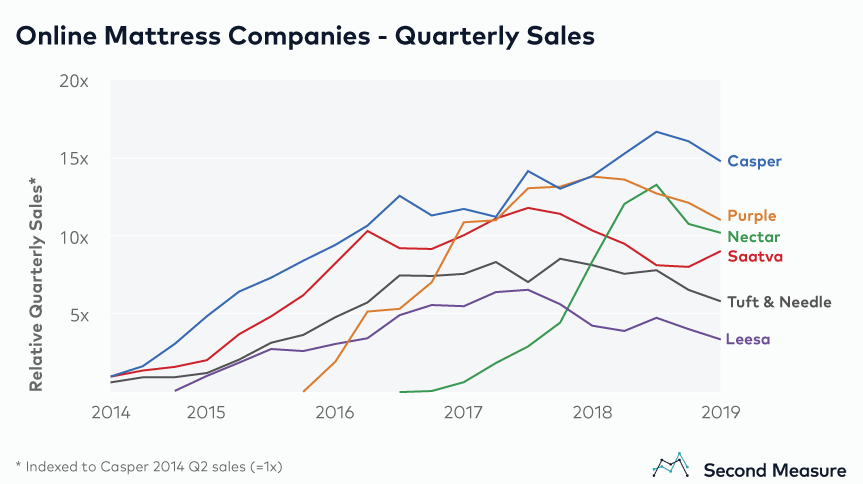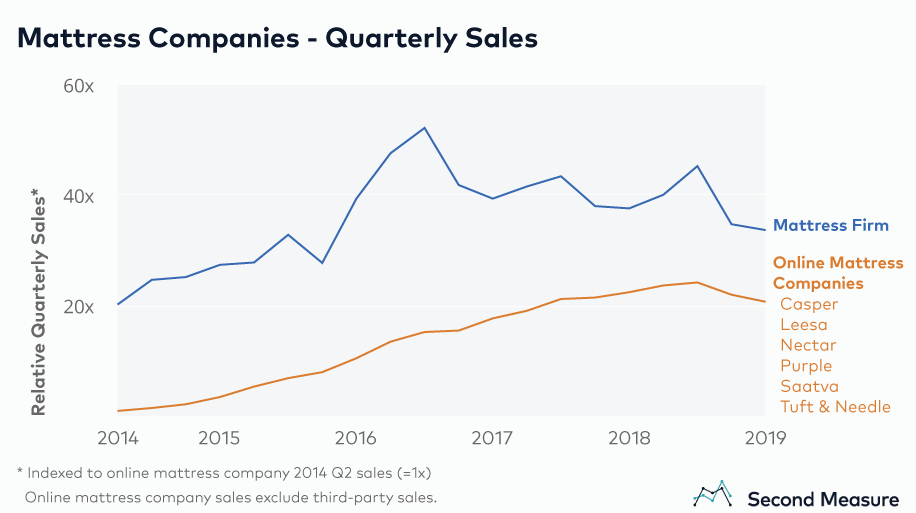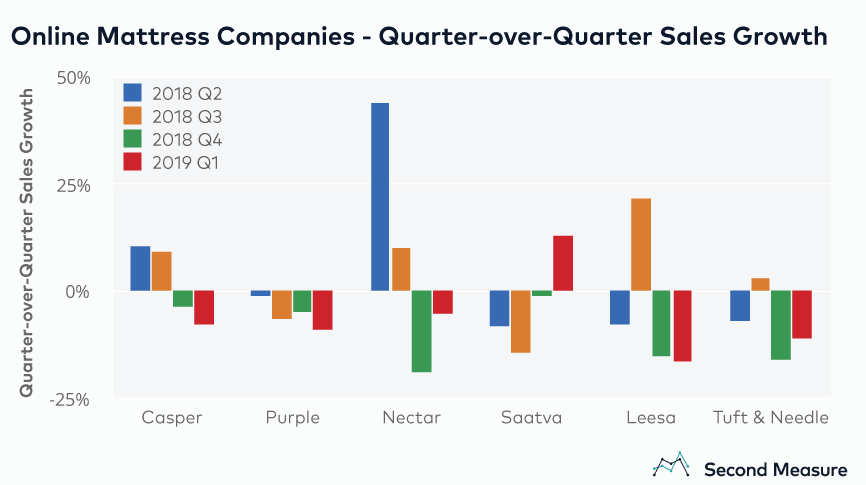NOTE: Bloomberg Second Measure launched a new and exclusive transaction dataset in July 2022. Our data continues to be broadly representative of U.S. consumers. As a result of this panel change, however, we recommend using only the latest posts in assessing metrics, and do not support referring to historical blog posts to infer period-over-period comparisons.
There is a long—and expanding—list of companies that made their names selling mattresses by mail, and the one at the top, Casper, is rumored to be heading toward IPO. Casper’s online sales are up year over year, but they’re not growing as rapidly as they once were. And despite all the hype and hundreds of choices, only a tiny fraction of U.S. consumers have ever ordered a bed in a box.
There are reportedly well over 100 companies vying to sell sleepy Americans foam mattresses compressed into tall boxes that arrive at their doorsteps. Amidst this fierce competition, Casper stands out. The company received a $1.1 billion valuation in March, and in the first quarter of 2019, U.S. sales through the company’s website and newly opened Casper stores were 34 percent higher than sales at Purple, Casper’s nearest competitor. That doesn’t include mattresses that have been financed or purchases made through either company’s major retail partners like Amazon, Target, and Costco.

The six companies in our analysis are among the top online sellers in the industry, and, Nectar Sleep, which is currently third in sales, is proving to be a company to watch. Nectar’s numbers include purchases from its website and its sister brands DreamCloud, Level Sleep, and Awara. Spending was up more than 500 percent year-over-year in the second quarter of 2018—the quarter when the DreamCloud luxury hybrid mattress debuted. And, this May, the brands’ parent company announced a rebranding and expansion into sales of other furniture and home goods.
Mattress Firm is declining, but still a bedding giant
All the hype over mattresses by mail has not been good news for bedding’s brick-and-mortar sellers. One of the nation’s largest, Mattress Firm, was under bankruptcy protection last fall, closed 700 stores, and lost its CEO in April. The company owns Mattress Barn, Sleepy’s, Sleep Train, and other brands.
Yet, even with its sales declining, Mattress Firm and its brands brought in six times more than Casper’s website and branded stores did in the first quarter of this year. In fact, the first-quarter online sales from the top six online mattress sellers combined only equal 62 percent of Mattress Firm’s sales.

Bed sales jumped at first, but online growth is now sleepy
The mattress-by-mail concept was an early hit. All of the top online sellers came on the scene less than a decade ago, and all saw web sales take off. In 2016 and 2017, double-digit quarter-over-quarter growth was a common occurrence for most of the companies in our analysis. But today, online sales have slowed or even stalled.

In the first quarter of 2019, only Saatva grew its online sales quarter over quarter. And, over the past year, the six companies in this report totaled far more negative quarters than positive ones.
The intensely crowded field of bed-in-a-box sellers is likely part of the reason sales are becoming sluggish. Beyond the many dozen bedding startups, legacy mattress retailers are now selling boxed beds. And then there’s Amazon and Walmart. Both launched their mailable mattresses last year. (Walmart’s version, Allswell, is currently taking a promotional tour around the country in a tiny home, which Walmart also sells.)
There’s another big challenge for this industry, as well. Even the most satisfied buyers aren’t likely to need more than one mattress a decade, or perhaps a few, if they’re buying for the family. Companies in this field don’t have much chance of repeat business. Data bears this out. At all but Tuft & Needle, more than 80 percent of customers in the first quarter were new.
In an effort to give buyers reasons to return, many of the mattress sellers have begun offering smaller-ticket sleep accessories, like pillows, sheets, and duvet covers. Casper even sells a $129 smart night light and a dog bed. All of these items are being marketed as essentials for the new mattress owner as well as cozy gifts they can give their friends.
Casper hypes its return policy, but most keep their beds
The good news for Casper is that customers are overwhelmingly hanging on to their new mattresses. The company has a generous return policy: a 100-night trial, a full refund upon return and couriers who come pack up and haul the mattress away. Data shows about 10 percent of Casper mattresses purchased online in 2018 were returned.
Like the beds themselves, companies have room to grow
Boxed beds have certainly made headlines in the last few years, but are they really making it into American bedrooms? Not as often as you might think. Presently, about one percent of U.S. consumers have ever made a purchase from one of the online mattress sellers in our analysis. For comparison, nearly five percent have bought something from Mattress Firm or one of its brands in the last five years.
Want to find out whether Casper’s rumored IPO puts a spring in online mattress sales? Request a demo.
Don’t Forget: We’re hiring.
